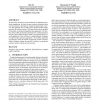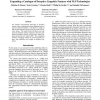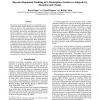1540 search results - page 3 / 308 » Deceptive agents and language |
ATAL
2003
Springer
13 years 11 months ago
2003
Springer
We previously developed a social mechanism for distributed reputation management, in which an agent combines testimonies from several witnesses to determine its ratings of another...
ATAL
2010
Springer
13 years 7 months ago
2010
Springer
Recent studies have investigated how a team of mobile sensors can cope with real world constraints, such as uncertainty in the reward functions, dynamically appearing and disappea...
FLAIRS
2009
13 years 4 months ago
2009
We evaluate conversational transcripts of deceptive speech using a sophisticated natural language processing tool called Coh-Metrix. Coh-Metrix is unique in that it tracks linguis...
AAAI
2006
13 years 7 months ago
2006
We present a model for buying agents in e-marketplaces to interpret evaluations of sellers provided by other buying agents, known as advisors. The interpretation of seller evaluat...
KESAMSTA
2010
Springer
13 years 4 months ago
2010
Springer
Computational Trust and Reputation (CTR) systems are essential in electronic commerce to encourage interactions and suppress deceptive behaviours. This paper focus on comparing two...



